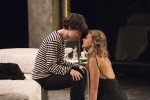Camille Legg as Romeo, left, and Adelleh Furseth as Juliet share an intimate moment in Studio 58’s Romeo and Juliet. (photo by David Cooper)
Shakespeare’s Romeo and Juliet is such a well-known play, done so many times on stage and on screen, it’s hard to imagine an original interpretation, but Studio 58 of Langara College manages to shine new light on this ageless tale.
This production marks the beginning of the studio’s 50th season and director Anita Rochon has incorporated that into her vision of the play, setting it in 1965, the year Studio 58 was born. Music from the 1960s – the catchy tunes of Velvet Underground, Rolling Stones, Turtles and others – permeates the show. Older audience members will recognize their youth in these songs, as well as in the clothing, but these are only frills. The core of the play remains unaltered – the immortal and tragic love story between Romeo and Juliet.
However, there is one profound adjustment to the classical version: Romeo is a girl. Accordingly, the pronouns are switched in the text, and a son becomes a daughter. Other than that, the text is more or less authentic, albeit abridged, for the student performance, and the young actors handle the 500-year-old verses with professional panache.
The change benefits the show. For most people in 21st-century North America, family feuds – to the death, anyway – are the stuff of legend, while parental resistance to their kids’ gay or lesbian inclinations is still all too real. Some experience it firsthand or have friends who did; others are on the parents’ side of the equation or know someone who was. But everyone in the audience could relate to this aspect of Romeo and Juliet’s forbidden love.
Everyone could also feel the wonder, the breathtaking discovery of their first encounter. Highlighted by the expressive and inventive choreography of Jewish community member Tara Cheyenne Friedenberg, the first meeting of the lovers felt almost like a ballet, a lyrical and beautiful duet, with the corps providing a counterpoint. The visual echoes from such classical ballets as Giselle or Swan Lake were unmistakable.
On the other hand, the fight scenes by David Bloom, who also happens to be a Jewish community member, were ferocious, with some really scary moments, especially when Mercutio swings a broken bottle at Tybalt. Both young actors, Conor Stinson-O’Gorman (Mercutio) and Kamyar Pazandeh (Tybalt), infuse their stage duel with energy, but all I could think about was, What if someone missteps and hurts his friend? Fortunately, no accidents occurred, and both combatants expired safely.
Of course, the two female stars of the show deserve mention – both acted brilliantly.
Camille Legg, who played Romeo, excelled in her part. Her Romeo was young and naive, a girl on the brink of adulthood, and her wide-eyed innocence made her character’s belief in the power of love plausible. Romeo’s love is radiant and boundless; her grief, all-encompassing.
Adelleh Furseth as Juliet, while strong overall, lacked enough of the child-like nature that I attribute to the character. She portrayed a more mature, more sexy Juliet, more a woman than a girl. At times, she struck me as a character actor or comedian, funny rather than naively exuberant.
The humming chorus during the play’s last scene, the young lovers’ double suicide, was inspired and poignant.
In the director’s notes, Rochon writes: “… there are real people all over the real world who are falling in love as you read this, in spite of all kinds of opposition arising because of their gender, nationality, political affiliation or otherwise. Familiar stories, but each with its own beating heart.”
Romeo and Juliet runs at Studio 58 until Oct. 18. For tickets, visit langara.ca/studio-58.
Olga Livshin is a Vancouver freelance writer. She can be reached at [email protected].

